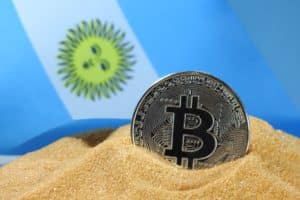Today, somewhat surprisingly, there is distinctly interesting news coming out of Argentina that indirectly concerns Bitcoin.
However, in order to fully understand the potential scope of this news, it is necessary to briefly describe the general picture of the situation in Argentina.
The situation in Argentina and the latest news about Bitcoin
Argentina is currently one of the countries in the world with the highest inflation rate calculated in local currency.
Indeed, in June it rose above 115%, and it has been above 100% since February. In other words, in the last 12 months prices in pesos have more than doubled on average.
The problem is the Peso (ARS) itself, the local currency, which is losing a great deal of value.
The value of the Peso in US dollars has been steadily falling at a sustained and steady pace since February 2020, that is, since the beginning of the pandemic.
Since the beginning of the year it has lost 41%, and in the last twelve months 56%.
Since February 2020 it has lost as much as 80% of its value against the US dollar, and compared to November 2018 the loss rises to 90%.
For a national fiat currency to lose 90% of its value against the US dollar in less than five years is really something resounding, and this severely affects the economic-financial situation of Argentine families.
Indeed, Argentina is again in a major economic crisis, although not yet at a level of severity comparable to that of, for example, the late 1990s.
Proposed solutions
All proposed and current policy solutions in recent years have failed. In other words, it seems that we are seeing a repetition of precisely a situation similar to that of the turn of the century, resulting in the biggest economic crisis the country has ever had to face.
It is worth noting that a very significant influence in Argentina’s political landscape has been held by the so-called Peronist parties, that is, heirs to the ideology underlying Juan Peron’s policies of the 1950s.
Incidentally, Argentina’s economic decline began in the 1930s, due in particular to the political instability that brought an authoritarian regime to power, and intensified during the period of so-called Peronism.
The problem arose with the aftermath of the Great Depression that began in 1929, and continued until the late 1970s particularly because of an increasing closure to international trade.
The 1980s saw the beginning of a sharp rise in inflation, which over the long term has not yet stopped.
An alternative solution is being proposed by the ultra-liberal Javier Milei.
Victory in the primaries
Argentina will hold new presidential elections in October. Since the country’s form of government is a presidential republic, whoever wins the presidential election will in fact govern the country.
Over the weekend, primary elections were held to decide which major contenders will compete in October.
The surprise was Milei’s victory, since no one thought he could pull it off.
His party (LLA, La Libertad Avanza) was only born in 2021, and was not among the favorites. Instead in Sunday’s primaries he won with 30% of the vote, ahead of the historic center-right and center-left parties.
In second place was Patricia Bullrich’s Juntos por el Cambio (JxC) with 28%, and in third was Sergio Massa’s Peronist party Union por la Patria (UP) with 27%.
In October, Milei will challenge Bullrich and Massa, who until yesterday seemed to be the favorites.
It is possible that Argentine voters are tired of going for the classic solutions proposed by the historic parties, since they have proven ineffective, and this time they want to go for something different.
Javier Milei
Milei’s proposed solution is inspired by liberalist ideas.
Milei is against excessive state spending, and tax increases.
He is a businessman and economist, and in the social field he is considered a right-wing conservative.
He is a specialist in economic growth, and has been a professor of various economic subjects in Argentine universities and abroad. In particular, for more than 21 years he was a professor of macroeconomics, growth economics, microeconomics, and mathematics for economists.
Milei is a supporter of the Austrian School and describes himself philosophically as an anarcho-capitalist.
These last two characteristics make it clear why he is also a big supporter of Bitcoin.
A few months ago he called Bitcoin “a natural reaction to the central bank scam.”
Argentina: the possible revolution thanks to Bitcoin and the latest news
At this point, should he also manage to win the presidential election and become president, a real revolution in Argentina in the monetary sphere can be expected.
The graph of the last five years of the Argentine central bank’s balance sheet shows an exponential expansion, which is still ongoing.
It is very likely that the cause of the excess inflation is due precisely to this overly expansive monetary policy.
While it seems very difficult for the new president to bring an end to this overly expansive monetary policy, it does not seem absurd, on the other hand, that in the event of Milei’s victory the country may decide to do as El Salvador did and decree Bitcoin legal tender alongside the Peso.
Given that, based on the numbers currently available, a Milei victory does not seem at all impossible, it behooves us to consider yesterday’s results potentially very good news for Bitcoin.
However, the markets have not reacted, perhaps because they still think a Milei victory in October is unlikely. Argentines’ distaste for ordinary political solutions that have been amply demonstrated not to work at this point could propel Milei to a historic and unexpected victory.
In any case, it is very likely that Argentines will be better off adopting Bitcoin at least as a secondary currency, in part because it continues to appreciate against the Peso.


